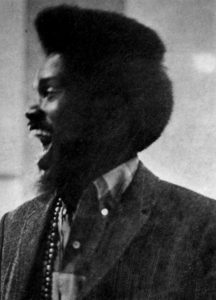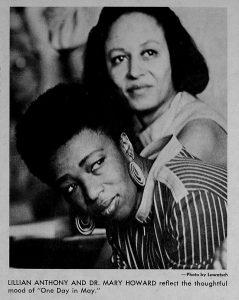History is not the past, it is the present. We carry our history with us. We are our history.
– James Baldwin
About “One Day in May”

Dr. Martin Luther King Jr. was assassinated in Memphis, Tennessee on April 4, 1968. His untimely death spawned great chaotic confusion. Rebellions exploded across American cities like never before. One part of this story is the revelation that took place at Augsburg during these tumultuous times. In response to Dr. King’s assassination and the political, cultural, and social chaos that followed, Augsburg conceived the idea of “One Day In May”.
On April 5, 1968, the day after Dr. King’s assassination, Augsburg President Oscar Anderson, addressed the great tragedy during Chapel “We must examine our own hearts. How much of what caused this is resident right here? We must not be so naive as to think that racism does not exist in the Augsburg community…Yesterday at the faculty meeting it was decided to hold a day in May when we would set aside everything and just listen to the minority communities. I’m not sure whether we can do that now or not. They may not be willing to talk to us, but we must be ready to listen and above all to examine our own hearts. This is a day of mourning. Let every class at Augsburg College today be conducted in memory of Dr. Martin Luther King”.
 One Day in May took place on May 15, 1968. Classes were canceled and the Augsburg community was encouraged to participate. One Day in May consisted of a series of workshops and lectures led by Augsburg faculty, as well as local Black community leaders. Some of these community leaders discussed Racism, Politics, and Power, Racism in Education, and Violence vs. Non-Violence.
One Day in May took place on May 15, 1968. Classes were canceled and the Augsburg community was encouraged to participate. One Day in May consisted of a series of workshops and lectures led by Augsburg faculty, as well as local Black community leaders. Some of these community leaders discussed Racism, Politics, and Power, Racism in Education, and Violence vs. Non-Violence.
Dr. King’s assassination and One Day in May had a great impact on students at Augsburg. A few days after the event, a student committee met with President Oscar Anderson and presented its recommendations for “changes the administration can make to cope with the racial situation”. The committee was Students for Reality in Education (SURE), a diverse student group led by Black women. SURE delivered a list of 11 demands to the institution (See the list below). SURE worked to democratize the Augsburg campus. They advocated for the rights of all underrepresented students and demanded institutional and curriculum change.
Marginalized students at Augsburg have always existed, communed, and resisted personal and institutional discrimination, however the events following Dr. King’s assassination and the efforts of SURE sparked a highly visible and unapologetic movement at Augsburg. Similar to other college campuses around the country, Black students at Augsburg formed a Black Student Union in 1968 and the Black Student Affairs Program in 1969. Soon after, the American Indian Support Program was established in 1978, the Asian American Support Program in 1992, the Hispanic/Latino Support Program in 1993, the GLBTQIA Support Services in 2003 and the International Student & Scholar Services in 2011.
Although these dates mark the official founding of these offices, official and unofficial student groups have existed and organized for many years. The Bisexual and Gay/Lesbian services (BAGLS) was established in 1988, the International Cross-Cultural Group and the Augsburg Asian Student Association were formed in 1991, Augsburg Indigenous Student Association formed in 2007, and Augsburg Latin American Students formed in 2008.
Dr. King’s assassination and One Day in May drastically changed the Augsburg Community and helped shape our University into what it is today. We owe a debt of gratitude to the students who organized and spoke out in 1968, and we have a responsibility to carry forward their efforts. The theme for our Martin Luther King, Jr. Convocation this year was “Where Do We Go From Here: Chaos or Community”; that was also the title of the faculty-lead panel during One Day in May. As we celebrate Augsburg’s 150th anniversary, we must pause to reflect on our history and once again ask the question “Where do we go from here”?
Hana Dinku
Elder Mahmoud El-Kati
Augsburg University Pan-Afrikan Center
68/20: ONE DAY IN MAY
During the Spring Semester of 2020, members of the Augsburg community embarked on a journey to uplift the story of ONE DAY IN MAY. Led by black voices and people of color, this art-driven campaign was launched in the midst of the Augsburg Sesquicentennial Celebration. The “68/20” designation references the historic 1968 ONE DAY IN MAY event and its ever-relevant implication for 2020 and beyond. The 68/20 project uses multiple engagement points to amplify the issues of race, equity and change. As we face a challenging 2020 with the pandemic crisis, we continue to draw from the spirit of ONE DAY IN MAY, and keep fighting for a better world.
Workshop Photos by Augsburg University / Caroline Yang
Timeline
Audio recordings
An archive of audio recordings from the “One Day in May” event in 1968 are available on this
YouTube playlist.
Augsburg Echo articles
1968 List of Demands
- Minority history by a minority instructor as a required course for all students, with no salary restrictions. Also the inclusion of minority contributions to all other existing history courses.
- A revised FAME** program that will be structured by black students at Augsburg. Hire Afro-Americans and members of other minority groups as counselors, recruiters and additional required personnel as specified in the FAME proposal.
- Employ members of minority groups as student recruiters.
- Employ members of minority groups as employment personnel for staff and faculty.
- Immediate sensitivity training for all faculty and staff members by an accredited organization approved by minority students at Augsburg.
- Revision of the religion department’s required courses to illustrate realistically today’s role of religion in waging wars, the Weber thesis and in the institutionalization of racism in America
- Employ a black or other minority member as a compliance officer for the enforcement of all contracts concurrent with Project Equality.
- Purchase only multiethnic texts in history, sociology, education. art and other areas wherever relevant, or by means of supplementary texts when necessary.
- An elective literature course dealing with minority authors and their contributions to literature. In addition a balanced emphasis of works by minority authors in required English courses.
- Bookstore promotion of literature by black and other minority authors.
- Realizing the concern and plans that have already been exhibited by involved faculty members and since Augsburg is an “inner city school,“ we want to further demand that Augsburg realistically train its teachers to be able to teach in the “ghetto schools.” This must include both classroom training and practical experience prior to student teaching. We also want to require five credits of the student teaching experience to be in the “inner city” schools.
























